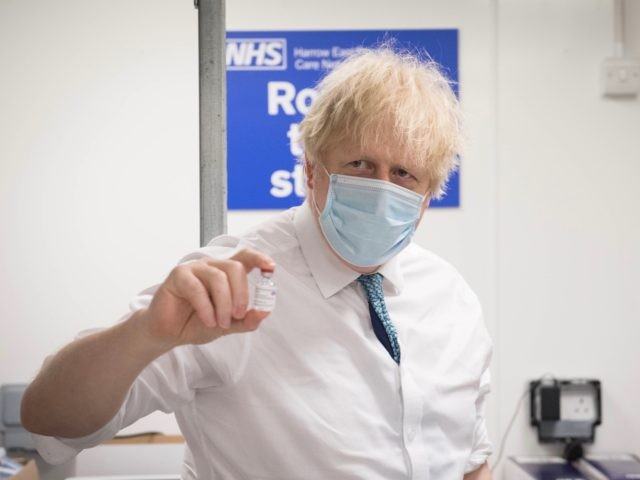Conservative MPs have called upon Prime Minister Boris Johnson to look to end lockdown restrictions after a study claimed that the Oxford-AstraZeneca vaccine cuts transmission of the Chinese coronavirus by over two-thirds.
A study released by Oxford University researchers in the medical journal The Lancet claimed that transmission might be reduced by 67 per cent by the vaccine, according to the analysis of PCR positive swabs in the UK.
The Oxford-AstraZeneca vaccine was also found, the study claimed, to have a 76 per cent success rate against symptomatic infection of coronavirus in patients who received just one dose of the vaccine.
The study said that there were zero hospitalisations recorded after the 22-day incubation period and that immunity “showed no evidence of waning of protection in the first three months after vaccination”.
Conservative Party backbenchers celebrated the apparent initial success of the vaccine, calling upon the government to reopen the economy and schools.
Former Tory leader Sir Iain Duncan Smith said per The Telegraph: “This is very significant and has a positive effect on coming out of lockdown as soon as possible. We have a chance to get the economy moving again quickly.”
“It paves the way for the Government to get kids back to school and reopening the economy,” Sir Iain added.
Prominent backbencher John Redwood joined the call to reopen, writing on social media: “More good news on [the] Astra Zeneca vaccine. More reason to plan [a] safe return to work and school.”
The Oxford-AstraZeneca jab was also found, the study said, to protect against hospitalisation for 12 weeks after the first dose is given.
A source from Whitehall said: “These findings are exactly what we need. The finding on hospitalisations is particularly significant. At the moment, we have got restrictions in place to stop people dying and to prevent the NHS keeling over.”
Health Secretary Matt Hancock hailed the study, saying: “This is a hugely encouraging study and further reinforces our confidence that vaccines are capable of reducing transmission and protecting people from this awful disease.
“This report shows the Oxford vaccine works, and works well. More than 9.6 million people have already received the first dose of their Covid-19 vaccine, and the NHS is working tirelessly to vaccinate as many people as possible in every part of the UK.”
Prime Minister Boris Johnson said that the study showed “really encouraging data” that the vaccine “provides significant protection against the virus”.
Despite the findings of the Oxford study, a senior government source told The Telegraph that the government has no plans to lift lockdown restrictions before March.
The source said that if all over-70s are vaccinated by February 15th, they will still need three weeks to develop the immunity and therefore March 8th would be the first date for a possible reopening.
“We hope it will be safe to commence the reopening of schools from March 8, with other economic and social restrictions being removed thereafter as and when the data permits,” the source said.
The Oxford trials also vindicated Britain’s widely criticised decision to space out inoculations by 12 weeks, reporting that the effectiveness of delaying a second dose by at least three months was 82.4 per cent effective compared to 54.9 per cent when doses are spread apart by fewer than six weeks.
The UK’s delayed dosing rollout came in defiance of recommendations from the World Health Organization (WHO), which advocated for a shorter interval between jabs.
European leaders were also critical of Britain’s plan, with France’s Europe minister Clement Beaune saying on Monday that the UK had taken “a lot of risks” with the spaced rollout.
The chief investigator of the Oxford Vaccine Trial and the co-author of the study, Professor Andrew Pollard, said the results support “the policy recommendation made by the joint committee on vaccination and immunisation (JCVI) for a 12-week prime-boost interval as they look for the optimal approach to rollout, and reassures us that people are protected from 22 days after a single dose of the vaccine”.
Dr Gillies O’Bryan-Tear, of the Faculty of Pharmaceutical Medicine, said: “The data support the recommendation to delay the second dose of the Oxford vaccine out to 12 weeks.”
He went on to proclaim that the results may indicate that the Oxford-AstraZeneca vaccine may be the “holy grail of the global vaccine rollout”, saying: “If these vaccines reduce transmission to the extent reported, it will mean that the easing of social restrictions will be enabled sooner, than if we have to wait for herd immunity, which may never, in fact, be achieved because of insufficient vaccine population coverage.”
Follow Kurt Zindulka on Twitter here @KurtZindulka

COMMENTS
Please let us know if you're having issues with commenting.